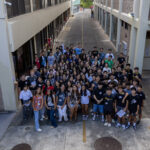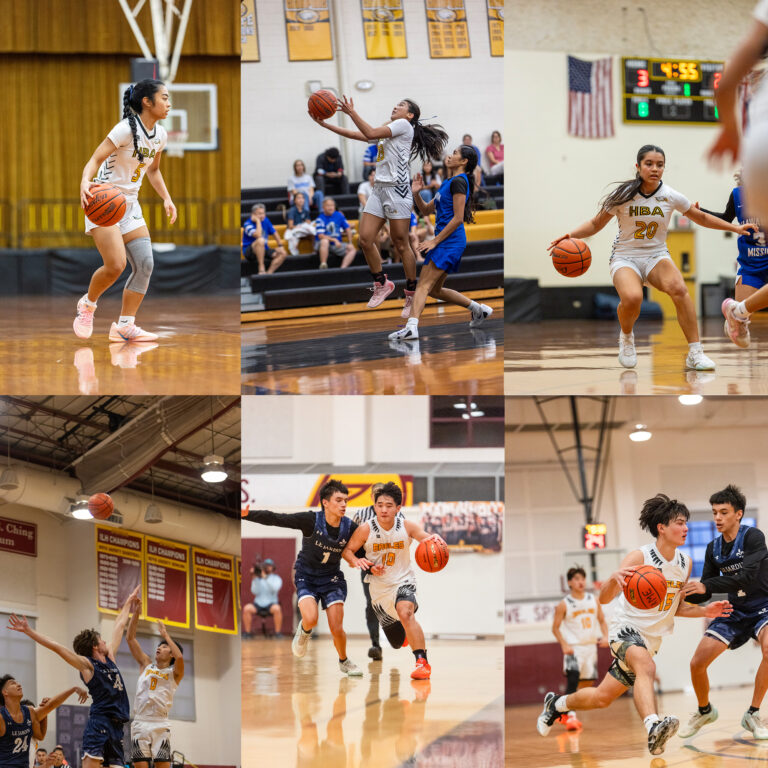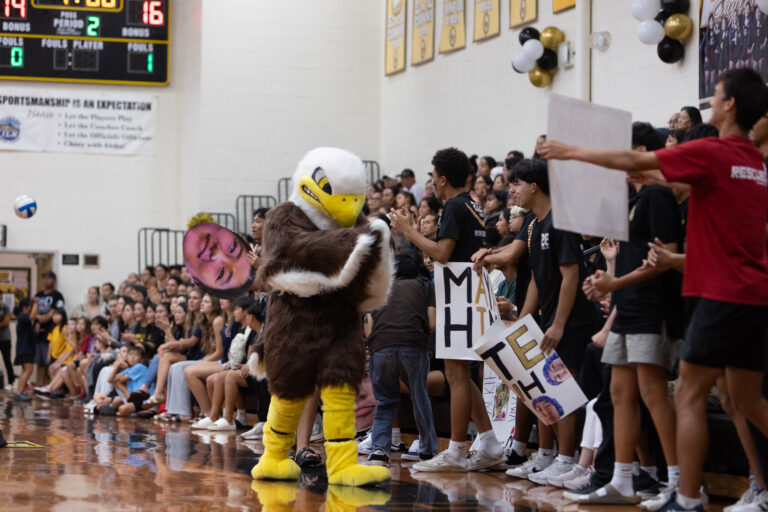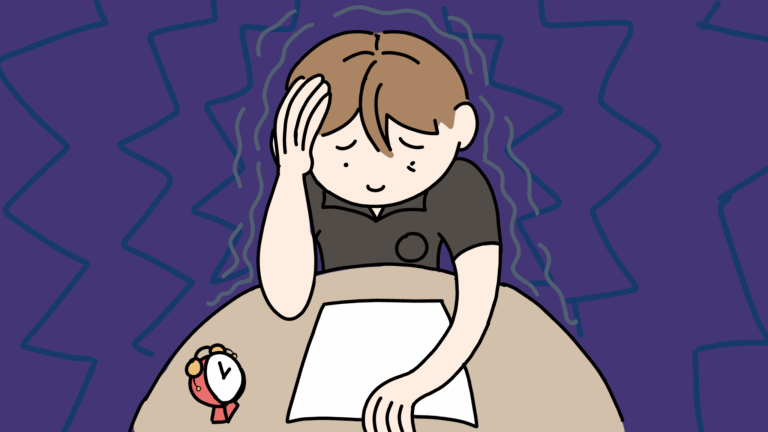(Above) Sophomores play games or watch videos on their phones while having lunch. Photograph by Kaitlyn Legawa (’28.)
Hawai’i Baptist Academy freshmen began the new school year with a significant change to the high school’s cell phone-use policy: 9th graders have to put away their cell phones throughout the school day, including during breaks and lunches. The administration also announced a proposed plan to extend the new restriction to all high school grades beginning in the second quarter.
According to the Boston Children’s Digital Wellness Lab, studies show that cell phone usage in school by students distracts them and reduces their focus and attention span. Along with an increasing number of schools nationwide restricting or banning cell phones from the school day, HBA has implemented a cell phone ban beginning with this year’s freshman class. Ryan Frontiera, high school vice principal, explained that the administrators made the decision after looking at data on the negative impact of cell phone use in schools. Since HBA middle schoolers have not been allowed to use cell phones during the school day, Frontiera explained that for most of them, the new cell phone policy should not feel like a drastic change. “We’ve noticed for the freshman class, especially with such a large group of new students that come in every year, [the ban] could create a much more intentional space for people to connect in person. The phone ban is meant to create a positive environment on campus,” he said.
So far, teachers and staff have noted that the freshmen have been abiding with the rule. Lunch time in the freshman area is filled with students talking to each other over their meals, with no phones in sight.
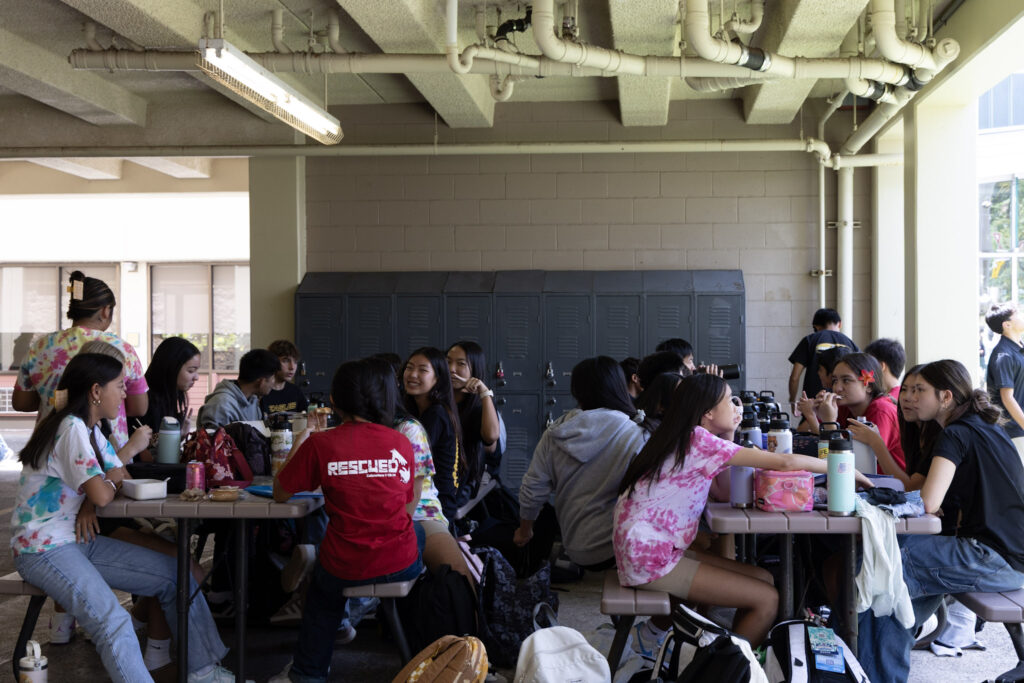
“I think that middle school has done a good job with giving us the self-control needed in order to make it through the day without worrying about our phones,” said Jack Okazaki, a returning freshman. He added, “I have to admit I was a little bummed to hear about the ban because I was looking forward to having more freedom; but I think that we will be fine.”
Nia Hawkins, a new freshman, shared Okazaki’s sentiments. “I was looking forward to using my phone during the school year, but I do understand the reasoning behind the ban. If it helps me stay more focused and spend time on things other than my phone, then I’m okay with it,” she said.
Many teachers report seeing positive outcomes from the freshman cell phone ban. Arlene Huster, librarian and freshman advisor, said, “I think it will help the freshman focus better and be more present with each other rather than being on their phones. It feels like the kids that I’ve interacted with have been working hard.” Since the library requires students to leave their cell phones as a deposit to check out a Chromebook or Chromebook charger, Huster has had to find other ways to keep freshmen accountable. However, she, like teachers who use phones as bathroom passes, is happy to deal with the inconvenience.
Risha Yeung, Biology teacher, observed that it will be harder for upperclassmen to adjust to a phone ban if it does take place in the second quarter. “It’s a little bit more challenging for them because they’ve had their phones. In the past, especially for the seniors and my science interns, maybe a couple times I’ve seen phones out, but they’ve immediately put it away. I do understand that the upperclassmen might have jobs or other things to communicate to parents because they have those responsibilities,” she explained. Currently, according to the school handbook, 10th through 12th graders are expected to “keep their phones on silent mode in their bags or lockers during school hours” and are allowed to use it during breaks and lunches.
Aaron Kondo, Math Department Chair, supports extending the ban to all grades. “I think some students probably were distracted by their phones. Finding a good balance between that and your studies is important. I think at some point it would be good to match whatever the freshmen have right now,” he said.
Anne Menks, Chemistry teacher, joined HBA this year from Trinity Christian School and sees both the benefits and costs of allowing students to use their phones during the school day. “I think phones have the ability to be a helpful tool when used to look things up, check school email, google classroom, and even play relaxing music while studying. Unfortunately, phones have access to so many things that are not helpful for learning that I believe they can become a distraction from staying on task and being engaged with those around you,” she said. Menks added that phone restrictions will help students develop useful habits for the future. “For this reason, I believe it is truly most helpful to make sure phones are not a big part of your day. Some people will find this comes more naturally than others but with a phone ban for all grades it can help everyone get into that habit and hopefully be something you can more easily continue after you graduate,” she said.
Even though the phone ban during breaks and lunches do not apply to them, some students in the 10th through 12th grade have have been making an effort stay off their phones to focus on in-person interactions. On a typical day, there are sophomores playing card games in the mall area during lunch and after school, and students in the breezeway playing volleyball or throwing footballs.
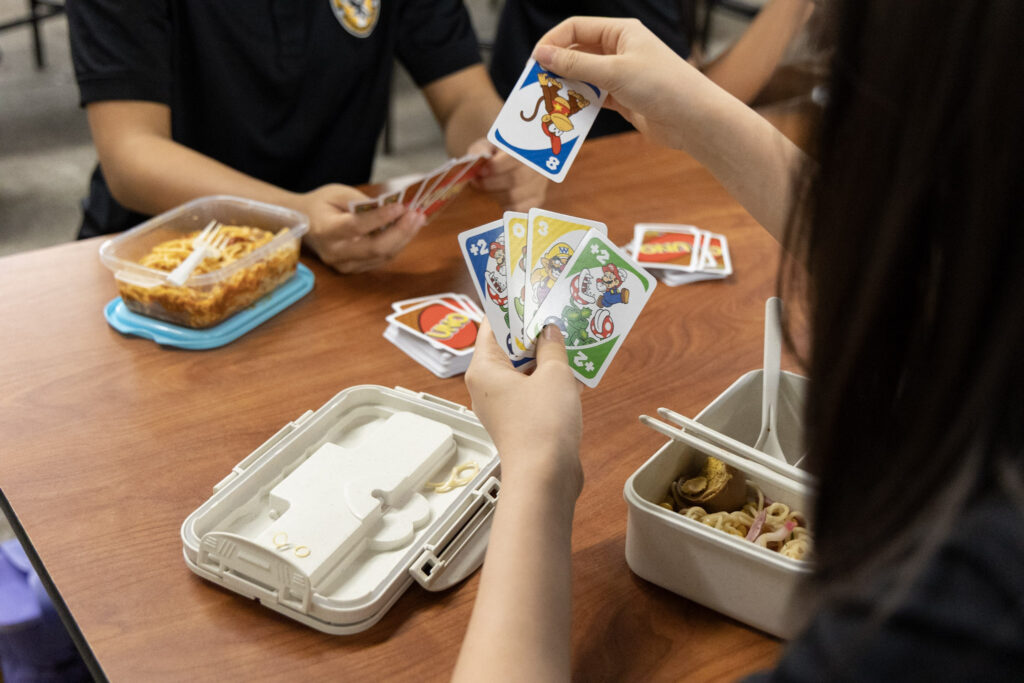
Sophomore Mary Matsukura observed, “A phone ban would limit distractions and could also make other students try to find other ways to find entertainment without their phones. I noticed that a good handful of the boys aren’t on their phone much and are playing volleyball instead.” Classmate Tiffany Shoho added, “I don’t want a phone ban for our grade but I think it would be helpful because people could start talking to others instead of being stuck to their screens all the time.”
Students aren’t the only ones who find it difficult to keep their focus away from cell phones. Many adults share the same struggle. Menks said, “I know that it’s tough for myself as an adult to realize when I have been swept away sitting at home watching YouTube shorts. Then I look at the clock and see I just wasted an hour watching news or Nate Bargatze clips when I really wanted to be doing some work.” Trisha Lee, elementary vice principal and parent of an HBA sophomore, said, “It’s easy to get lost in the Korean dramas on Netflix or play games on our cell phones instead of interacting with others and trying to make awkward conversations with new people.” She added that finding a meaningful reason to stay off one’s phone is important. “I believe the two greatest commandments are to love God and love people. I understand that sometimes the phone may help us to love God and love others but I feel like a more effective way to love the people around us is to give them our attention. Relationships are important and the way you build it is through communication and shared experiences. I believe real time, in-person connections and interactions are crucial to develop during high school and helps develop interpersonal skills that will serve you well your entire life,” she explained.
Frontiera announced in an all-school assembly that the administrators are open to students’ feedback regarding the proposed expansion of the ban to all grades. Those who wish to share their feedback should contact him directly. Students were also invited to share their views during a homeroom reflection survey after the all-school assembly.


